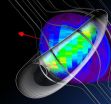(Press-News.org) For the ancient ancestors of plants and animals, a partnership with other microbes was once formed during an endosymbiotic event to give rise to eukaryotes. Plants and animals, over billions of years of trial and error, made efficient use of different energy sources in the environment, namely carbon dioxide and oxygen.
In the advanced online edition of Molecular Biology and Evolution, authors Maurino, et. al., explore the evolution of a family of enzymes, called 2-hydroxy acid oxidase, or 2-HAOX, that break down fats in both plant and animals. They wanted to test and see if they could trace the evolution of 2-HOAX back to a common ancestor that once gave rise to these enzymes. They built a database of all known 2-HAOX sequences in plants, animals and bacteria and reconstructed phylogenetic trees to test their hypothesis as wells as examining the functional differences through enzyme tests.
Their data supports the evolution of 2-HOAX from a common ancestral gene, with plants and animals evolving these enzymes independently, in ancient organisms responsible for the evolution of simpler animals and plants. This provides an example of how plants and animals have adapted differently to similar environmental conditions in order to meet their energy needs.
INFORMATION: END
Metabolism gives a boost to understanding plant and animal nutrient evolution
Recent highlights in Molecular Biology and Evolution
2014-02-14
ELSE PRESS RELEASES FROM THIS DATE:
Gene for dissected leaves
2014-02-14
This news release is available in German. Spinach looks nothing like parsley, and basil bears no resemblance to thyme. Each plant has a typical leaf shape that can differ even within the same family. The information about what shape leaves will be is stored in the DNA. According to researchers at the Max Planck Institute for Plant Breeding Research in Cologne, the hairy bittercress (Cardamine hirsuta) has a particular gene to thank for its dissected leaves. This homeobox gene inhibits cell proliferation and growth between leaflets, allowing them to separate from each ...
Our brain has switch board to guide behavior in response to external stimuli
2014-02-14
How do our brains combine information from the external world (sensory stimulation) with information on our internal state such as hunger, fear or stress? NERF-scientists demonstrate that the habenula, a specific part in our brain consisting of neural circuits, acts as a gate for sensory information, thus regulating behavior in response to external stimuli.
Emre Yaksi (NERF – VIB/imec/KU Leuven): "Our brain has high levels of spontaneous activity, even in the absence of sensory stimulation. We think that this spontaneous neural activity in combination with sensory stimulation ...
Inside out at the 2014 AAAS meeting: The impact of gut flora on diabetes and obesity
2014-02-14
In recent years, the 1.5 kilos of bacteria that live inside our bodies, mainly in the gut, have proven their crucial importance for our healthy functioning. Beyond their more obvious role in digestion, they are also involved, for example, in the development of the immune system and the neuronal system, and in the onset of certain diseases.
Three leading European researchers on the gut microbiome will share their recent findings on the relations between gut flora and obesity, diabetes, and cardio-metabolic diseases in general.
Links Between Human Gut Microbiota and Metabolic ...
NASA's IBEX helps paint picture of the magnetic system beyond the solar wind
2014-02-14
Understanding the region of interstellar space through which the solar system travels is no easy task. Interstellar space begins beyond the heliosphere, the bubble of charged particles surrounding the sun that reaches far beyond the outer planets. Voyager 1 has crossed into this space, but it's difficult to gain a complete global picture from measurements in only one direction.
Spacecraft data in the past five years from near Earth and cosmic ray observations have painted a better picture of the magnetic system that surrounds us, while at the same time raising new questions. ...
Impaired recovery from inflammation linked to Alzheimer's
2014-02-14
New research from Karolinska Institutet in Sweden shows that the final stage of the normal inflammatory process may be disrupted in patients with Alzheimer's disease. A study published in the journal Alzheimer's & Dementia shows that levels in the brain and cerebrospinal fluid of the molecules necessary for tissue recovery through the clearance of harmful inflammatory substances are lower than normal in patients with Alzheimer's disease. The study also showed association between the lower levels of these molecules with impaired memory function.
Alzheimer's disease is ...
Social norms strongly influence vaccination decisions and the spread of disease
2014-02-14
Our response to societal pressures about vaccination has a direct effect on the spread of pediatric infectious diseases in areas where inoculation is not mandatory, says new research published this week in Proceedings of the Royal Society B.
By incorporating social norms into predictive mathematical modelling, a research team from the University of Guelph and the University of Waterloo found that they can foresee the observed patterns of population behaviour and disease spread during vaccine scares—times when anti-vaccine sentiment is strong.
"If vaccination is not ...
New insight into protein misfolding in neurodegenerative disorders
2014-02-14
Research by the University of Southampton has provided new insight into the consequence of accumulated 'misfolded proteins' in neurodegenerative disorders, such as Prion and Alzheimer's disease.
Prion and Alzheimer's disease are protein misfolding brain diseases, where genetic mutations, or more commonly, interactions between an individual's genetics and environmental influences cause functional proteins in neurons to become misfolded or misrouted. In these diseases, there is a progressive death of nerve cells in specific brain regions, which is associated with the increasing ...
Geographical passwords worth their salt
2014-02-14
It's much easier to remember a place you have visited than a long, complicated password, which is why computer scientist Ziyad Al-Salloum of ZSS-Research in Ras Al Khaimah, UAE, is developing a system he calls geographical passwords.
Writing in a freely available "open access" research paper in the International Journal of Security and Networks, Al-Salloum emphasizes how increasingly complicated our online lives are becoming with more and more accounts requiring more and more passwords. Moreover, he adds that even strong, but conventional passwords are a security risk ...
Antimicrobial preservation strategies to prevent food contamination
2014-02-14
New Rochelle, NY, February 13, 2014—Food spoiling and poisoning caused by microbial contamination can cause major health, social, and economic problems. The broad scope of antimicrobial approaches to kill or prevent the growth of microorganisms in foods and beverages, including a variety of natural and artificial preservative strategies, are described in a comprehensive Review article in Industrial Biotechnology, a peer-reviewed journal from Mary Ann Liebert, Inc., publishers. The article is available on the Industrial Biotechnology website.
In the Review "Ingredient ...
New depression treatments reported
2014-02-14
MAYWOOD, IL – New insights into the physiological causes of depression are leading to treatments beyond common antidepressants such as Prozac and Zoloft, researchers are reporting in the in the journal Current Psychiatry.
Depression treatments on the horizon include new medications, electrical and magnetic stimulation of the brain and long-term cognitive behavioral therapy for stress management.
Authors are Murali Rao, MD, and Julie M. Alderson, DO. Rao is professor and chair of the Department of Psychiatry and Behavioral Neurosciences at Loyola University Chicago ...
LAST 30 PRESS RELEASES:
Why chronic pain lasts longer in women: Immune cells offer clues
Toxic exposure creates epigenetic disease risk over 20 generations
More time spent on social media linked to steroid use intentions among boys and men
New study suggests a “kick it while it’s down” approach to cancer treatment could improve cure rates
Milken Institute, Ann Theodore Foundation launch new grant to support clinical trial for potential sarcoidosis treatment
New strategies boost effectiveness of CAR-NK therapy against cancer
Study: Adolescent cannabis use linked to doubling risk of psychotic and bipolar disorders
Invisible harms: drug-related deaths spike after hurricanes and tropical storms
Adolescent cannabis use and risk of psychotic, bipolar, depressive, and anxiety disorders
Anxiety, depression, and care barriers in adults with intellectual and developmental disabilities
Study: Anxiety, gloom often accompany intellectual deficits
Massage Therapy Foundation awards $300,000 research grant to the University of Denver
Gastrointestinal toxicity linked to targeted cancer therapies in the United States
Countdown to the Bial Award in Biomedicine 2025
Blood marker from dementia research could help track aging across the animal world
Birds change altitude to survive epic journeys across deserts and seas
Here's why you need a backup for the map on your phone
ACS Central Science | Researchers from Insilico Medicine and Lilly publish foundational vision for fully autonomous “Prompt-to-Drug” pharmaceutical R&D
Increasing the number of coronary interventions in patients with acute myocardial infarction does not appear to reduce death rates
Tackling uplift resistance in tall infrastructures sustainably
Novel wireless origami-inspired smart cushioning device for safer logistics
Hidden genetic mismatch, which triples the risk of a life-threatening immune attack after cord blood transplantation
Physical function is a crucial predictor of survival after heart failure
Striking genomic architecture discovered in embryonic reproductive cells before they start developing into sperm and eggs
Screening improves early detection of colorectal cancer
New data on spontaneous coronary artery dissection (SCAD) – a common cause of heart attacks in younger women
How root growth is stimulated by nitrate: Researchers decipher signalling chain
Scientists reveal our best- and worst-case scenarios for a warming Antarctica
Cleaner fish show intelligence typical of mammals
AABNet and partners launch landmark guide on the conservation of African livestock genetic resources and sustainable breeding strategies
[Press-News.org] Metabolism gives a boost to understanding plant and animal nutrient evolutionRecent highlights in Molecular Biology and Evolution




